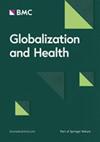A monetary model of global peace and health
IF 5.9
2区 医学
Q1 PUBLIC, ENVIRONMENTAL & OCCUPATIONAL HEALTH
引用次数: 0
Abstract
This study aims to expand on the concept of peace and health by drawing from Keynes' theory of the economic consequences of peace, in light of the global pandemic experienced in 2020 due to COVID_19. In this paper, I will elaborate on the concept of ‘security’, as an indicator of peace in the time of biological shocks, in order to expand the definition of Keynesian precautionary motivation. This puts forth a new monetary policy model developed to make contributions to achieving global peace. In so doing, I will calculate the optimal growth rate of discount rate through utilizing the Global Peace Index (GPI), adjusted by the Case Fatality Risk (CFR) of COVID-19 in a dynamic shopping time monetary model. This analysis is comprised of the top 15 GDP countries as well as the 10 most and least peaceful countries in 2020. The results indicate that households in more peaceful and healthy countries tend to hold less money compared to those in less peaceful and healthy countries. Besides, the discount rate needs to be reduced due to the outbreak of COVID-19 and the decrease in the level of peace in the economy. Insofar as the imposition of fines through international legal circles on countries with an insignificant health and peace policy will increase the cost of liquidity, other alternative methods of financing will be affor dable for the countries.全球和平与健康的货币模式
本研究旨在通过借鉴凯恩斯关于和平的经济后果的理论,结合 COVID_19 在 2020 年造成的全球大流行,扩展和平与健康的概念。在本文中,我将阐述 "安全 "的概念,将其作为生物冲击时期的和平指标,以扩展凯恩斯预防动机的定义。这就提出了一个新的货币政策模型,旨在为实现全球和平做出贡献。为此,我将在动态购物时间货币模型中利用全球和平指数(GPI)计算贴现率的最佳增长率,并根据 COVID-19 的病例死亡风险(CFR)进行调整。该分析包括 2020 年 GDP 排名前 15 位的国家以及 10 个最和平和最不和平的国家。结果表明,与和平和健康程度较低的国家相比,和平和健康程度较高的国家的家庭往往持有较少的货币。此外,由于 COVID-19 的爆发和经济和平水平的下降,贴现率需要降低。如果通过国际法律界对卫生与和平政策不力的国家处以罚款,将会增加流动资金的成本,因此这些国家可以采用其他融资方式。
本文章由计算机程序翻译,如有差异,请以英文原文为准。
求助全文
约1分钟内获得全文
求助全文
来源期刊

Globalization and Health
PUBLIC, ENVIRONMENTAL & OCCUPATIONAL HEALTH-
CiteScore
18.40
自引率
1.90%
发文量
93
期刊介绍:
"Globalization and Health" is a pioneering transdisciplinary journal dedicated to situating public health and well-being within the dynamic forces of global development. The journal is committed to publishing high-quality, original research that explores the impact of globalization processes on global public health. This includes examining how globalization influences health systems and the social, economic, commercial, and political determinants of health.
The journal welcomes contributions from various disciplines, including policy, health systems, political economy, international relations, and community perspectives. While single-country studies are accepted, they must emphasize global/globalization mechanisms and their relevance to global-level policy discourse and decision-making.
 求助内容:
求助内容: 应助结果提醒方式:
应助结果提醒方式:


